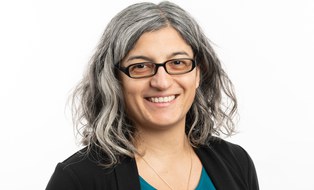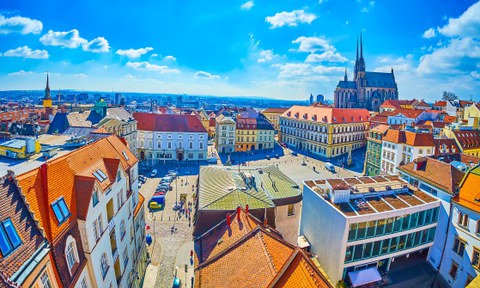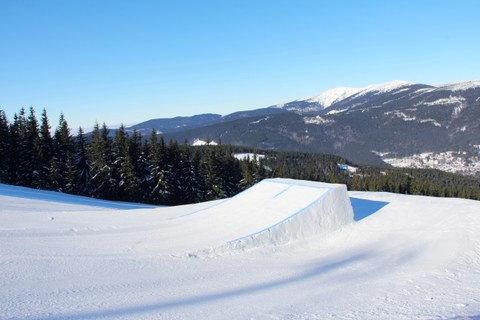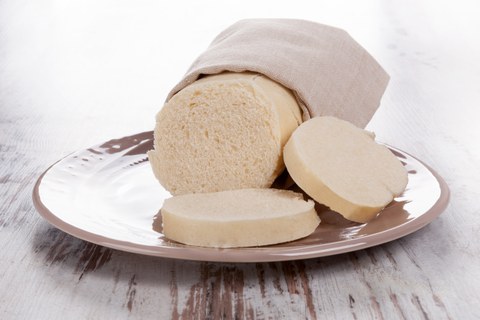Partner Country of the Month February 2021: Czech Republic
A country where people greet each other with Ahoj! without having direct access to the sea must be something very special. And indeed, we have a lot more to thank the Czech Republic for than the invention of Pilsner or Franz Kafka. The multifaceted, historically rich country in our immediate neighborhood is definitely worth studying in more detail!
With the "Partner Country of the Month" campaign, we want to shine a spotlight on the wide diversity of countries, regions and partner universities of TU Dresden that our students can explore during a semester abroad.
Table of contents
General facts and figures about Czech Republic
Capital: Prague
Population: 10,65 million
Official language: Czech
National holiday: 28 October
Currency: Czech koruna (CZK)
You can find further facts, figures and information on Wikipedia or at Visit Czech Republic.
Language matters
- Hello - Ahoj!
- How are you? - Jak se vede?
- My name is ... - Jmenuji se ...
- What costs ...? - Co stojí ...?
- Thank you - Děkuji
For most universities in the Czech Republic, it is essential that you arrive with a knowledge of Czech, although some programs also offer courses in English. Please check what the exact requirements are before applying or ask your Erasmus coordinator.
You can learn Czech at TUDIAS or at the VHS. In addition, there are the Czech-German Culture Days to practice the language and expand intercultural understanding. Every year in the fall, especially here in the Euroregion Elbe/Labe, a diverse program is put together with the opportunity for German-Czech encounters.
Did you know that ....?
- the Little Mole is a Czech invention? He was first brought to life in 1957 by the Prague cartoonist Zdenek Miler.
- that the Czech Republic is the land of the unbelievers? Only 19% of the population say they believe in God.
- Charles University in Prague is the oldest still active university in Central Europe? It was founded in 1348 and still enjoys an excellent reputation today.
- that the Czechs are the leaders in beer consumption? Nowhere in Europe is more beer drunk per capita than in the Czech Republic. In 2018, per capita consumption was 141 liters per year (but this figure also includes the consumption of numerous tourists, which should not be underestimated). By comparison, per capita consumption in Germany is around 100l a year.
- the sugar cube was invented in Moravia and a patent was applied for in 1843?
Cooperation with TU Dresden
You can find all cooperations of TU Dresden in our database. Have a look at the experiences of our previous exchange students at Questionnaires. Professors at your faculty may have direct contacts to your partner university of choice and can advise you.
Our cooperations with Czech partner universities are part of Erasmus+. You can find the contact persons and application deadlines for your faculty here. Additionally, there are attractive scholarships of the Community for Student Exchange in Central and Eastern Europe specifically for Czech Republic, which can be used both for exchange semesters and for internships.
Our Czech partner universities via Erasmus+
Brno
- Brno University of Technology
- Mechanical Engineering (faculty)
- Civil Engineering
- Electrical Engineering and Information Technology
- Aerospace Engineering
- Mendel University in Brno: Forest Sciences
- Masaryk University Brno
- Computer science
- Medicine
- German as a Foreign Language
České Budějovice
- Jihočeská univerzita v Českých Budějovicích
- Slavic Studies
- Psychology
Liberec
- Technická univerzita v Liberci
- Vocational Education
- General Education Science
- Social Pedagogy
- Mechanical Engineering (faculty)
- IHI Zittau (Social and Business Studies)
- Business Administration and Economics
Olomouc:
- Univerzita Palackého v Olomouci
- History of Art
- Geo Sciences
- Psychology
- Traffic Engineering
- German Studies
Ostrava
- Vysoká škola báňská - Technická univerzita Ostrava
- Power Engineering
- Computer Sciences
- Ostravská Univerzita: Slavic Studies
Pardubice
- Univerzita Pardubice: IHI Zittau (Social and Business Studies)
Plzeň
- Západočeská univerzita v Plzni
- Mathematics
- Slavic Studies
Prague
- České vysoké učení technické v Praze
- Mechanical Engineering (Faculty)
- Civil Engineering
- Electrical Engineering and Information Technology
- Transport Engineering
- Computer Science
- Hydro Sciences
- Architecture
- Česká Zemědělská Univerzita v Praze
- Forestry Science
- Geo Sciences
- Vysoká škola ekonomická v Praze: Business Administration and Economics
- Charles University in Prague
- Biotechnology
- German as a foreign language
- Geo Sciences
- History
- International Relations
- Catholic Theology
- Communication Sciences
- History of Art
- Mathematics
- Medicine
-
Physics
- Law
- Slavic studies
- Sociology
- Business Administration and Economics
Presentation of Charles University Prague in German language by the Erasmus coordinator © TUD
- Vysoká Skola Ekonomická v Praze: Economics
- Ceské Vysoké Uceni Technické v Praze
- Traffic Engineering
- Architecture
- Mechanical Engineering (entire faculty)
- Electrical Engineering and Information Technology
- Civil Engineering
- Computer Science
Ústí Nad Labem:
- Univerzita Jana Evangelisty Purkyne v Ústí Nad Labem:
- History
- Economics
- Geo Sciences
- Biology
- Slavic studies
- German as a foreign language
- IHI Zittau, Environmental Sciences
Don't miss...
... Prague is of course a must see and with its numerous historical sites, such as the Charles Bridge or Prague Castle, as well as stylish cafes (e.g. Coffee Factory) and of course curiosities such as the Dancing House, offers plenty of tourist hotspots that should not be missed. In addition, you should not miss other perspectives on the city, for example on a Corrupt Tour, which presents the current history of Prague from a very special point of view. Also worth seeing is the John Lennon Wall in Mala Strana!
David Černý: the sculptor from Prague has made a name for himself especially with projects in his hometown. Sometimes disturbing motifs such as urinating men in the courtyard of the Kafka Museum and crawling babies on the TV tower attract attention. His works can also be found in Liberec and London.
Winter sports in the Czech Republic: destinations like Klínovec or Spindleruv Mlyn are becoming more and more popular. This is of course due to unbeatable prices, but also the slopes are getting better and better and offer an alternative to the Alps.
Bohemian Switzerland: The main attraction is of course the Prebisch Gate, but other formations are also worth a trip. You should definitely visit the Stone Organ (Panska Skala or Manor Rock): meter-high basalt columns indeed remind of an organ. A hike also offers beautiful views of the surrounding countryside, such as the Ore Mountains and the Czech low mountain ranges.
Let's get cooking...
The most popular accompaniment to Czech dishes are - who would have guessed it - dumplings. You can find them in numerous variations, as hearty bread dumplings, which are served with a hearty roast, but also as a sweet dessert in the form of fruit dumplings. Since the recipe is super easy to recreate and tastes great to boot, we present to you here a basic recipe for authentic Czech bread dumplings, served with dill cream sauce with egg. We were inspired by: Petra Kupská.
Ingedients:
For the dumplings:
- 1 older roll
- 500 g coarse flour (type 405)
- salt
- 1 egg
- a pinch of sugar
- 250 ml lukewarm water
- 10 g fresh yeast
For the sauce:
- 1 l beef broth
- 30 g fresh dill
- 60 g butter
- 40 g wheat flour
- 250 ml whipping cream (about 30 % fat)
- 3 tablespoons vinegar
- 70 g sugar
- salt
- 4 eggs
Method:
1) Let's start by making the dumplings:
- Cut the bread roll into 1x1cm cubes.
- Mix the flour with 2 pinches of salt in a bowl and make a well in the middle of the mixture, where you place the egg. Add the crumbled yeast and the sugar. Then carefully pour lukewarm water over everything.
- Using a fork, lightly mix the egg with the water and the yeast and let everything rest for 5 minutes in a warm place.
- Knead the mixture into a soft dough and finally add the bread cubes.
- While the dough is covered with a clean cloth and left in a warm place for 30 minutes, you can start making the dill sauce.
2) Prepare the dill sauce as follows:
- In a thick-bottomed saucepan, melt the butter and stir in the flour. Stir the mixture and let it sweat for about 2 minutes.
- Then add the warm beef broth little by little. Don't forget to stir in between and make sure that the mixture is smooth and doesn't form lumps (so don't add the stock all at once).
- Boil the mixture briefly, then reduce the heat again and let everything simmer gently for 20 minutes, stirring occasionally.
- Finally, add the cream, sugar and vinegar and mix well.
3) Now let's get back to the dumplings:
- Form two long dumplings from the dough and put them in a big pot. Make sure that the dumplings have enough space, they will get bigger during cooking.
- Put the dumplings in boiling salted water and cook them gently for 18 minutes. Halfway through the cooking, turn the dumplings once.
- Once the dumplings are cooked, take them out of the water and pierce the surface with a fork at regular intervals to let the steam escape.
Finally, to complete the dish, boil, peel and halve the eggs and refine the sauce:
- To do this, add the finely chopped dill to the sauce and cook everything again for 2 minutes on low heat so that the sauce takes on the flavor of the dill.
- Then remove the sauce from the heat and let it rest for 5 minutes before serving.
Set the table and dobrou chut'!
For those of you who like to experiment, here is a tip for a more elaborate, but also very authentic dish: Utopenci - "drowned people" ;)
Contact
Have you had a great time in Czech Republic? Successfully spent a semester abroad in Prague or enjoyed the natural beauty of Bohemian Switzerland and the Giant Mountains? Do you have tips for places and experiences that are not to be missed? We would be happy to share your experiences here, on social media or, if you want, in information events for other TUD students. Get in touch with us:
 © Sven Ellger/TUD
© Sven Ellger/TUD
Advice on studying abroad
NameMs Federica Serra
Infocenter/ Study abroad; TUDworldwide: America
Send encrypted email via the SecureMail portal (for TUD external users only).
Visiting address:
Fritz Foerster Bau, Office 161 Mommsenstraße 6
01069 Dresden
Postal address:
TUD Dresden University of Technology International Office
01062 Dresden
Office hours:
- Tuesday:
- 09:30 - 11:30
- 12:30 - 14:30
- Thursday:
- 09:30 - 11:30
Please register at the SCS (FOE, floor 0). ** No office hours between 12 and 20 February 2026 **
Looking for first-hand information?
Would you like to know more about Czech Republic? Ask our alumni ambassadors - TUD alumni who are active in many countries around the world and can give you information and advice for your stay abroad.
Getting in touch is very easy: On this interactive world map, markers indicate the cities where our alumni ambassadors live. There is a short profile with contact information for each ambassador.
Partner Countries Archive
Have you missed a partner country? No worries! Here you can read up on all articles.
|
Europe (Erasmus+) |
|
|
Africa |
|
|
America |
|
|
Asia |
|
|
Australia and Oceania |
|








